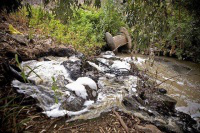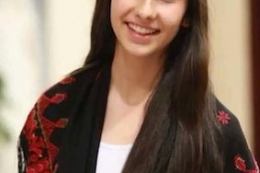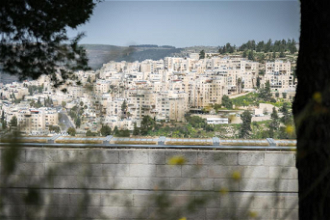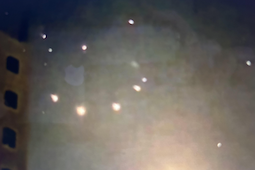Holy Land: village flooded with sewage from new settlements

Sewage running from settlements into Jalbun village. Photo by: Jalbun City Council
Jalbun village, 13 km from Jenin, is surrounded by three new Israeli hilltop settlements: Ma'ale Gilboa, 600 metres away; Mirav Kibbutz, at a distance of 150 metres, Malkishua, one km away, and a dairy farm. It is also now surrounded by the Partition Wall on three sides.
Life is very hard for the 2,493 residents of the village because the earth under them is being saturated with waste water and sewage flowing from the hilltop settlements.
At least 60% of the population in the village depends on agriculture for their main income and now, according to Samir Abu al-Roub, chairman of the Jablun local council, their plants are no longer green. "They are dying due to chemicals in the sewage. When sewage is absorbed into the land, farming becomes impossible," he said.
The wall, which surrounds the village on three sides is making matters worse, because it forces a channel of sewage to run directly through the village,
Jamal Abu Al- Rob a resident of Jalbun said: "The sewage went through our streets and homes. The smell was terrible. They let the cows get rid of their waste then it flows to our homes because they do not take care of it. I have also 45 sheep but no water for them to drink."
In addition to sewage problems, Jalbun is also disconnected from the larger water network. Residents who need water have to buy it from a water company. The water comes in trucks and it is expensive.
"I cannot afford to buy water for 45 sheep and my family. This is too much," Jamal said.
Palestinians have been going without water for days and months at a time, because of a reduced supply as a regional drought enters its fifth year.
Israel, which controls almost 90 percent of the water sources in the West Bank, has many restrictions on the water distribution to the West Bank.
"Residents of most West Bank villages only receive running water once a week and some have not received running water in months. This problem of water shortage is not only a health hazard but a social and agricultural challenge," Dr Nader Al- Khateeb General Director of the Water & Environment Development Organization (WEDO) said.
Palestinian officials say Israel controls some 50 West Bank wells, with a total capacity of 50 million cubic metres per year, directing it mainly to Jewish settlements, which house some 250,000 people. The Palestinians control about 200 shallow wells in the West Bank, many of them drilled before the 1967 war in which Israel occupied the West Bank and Gaza. Those wells produce about 105 million cubic metres per year, but they are meant to supply water to 2.5 million Palestinians, according to OCHA.
A Caritas spokesman said: "Water is for everyone it's a right for basic living. Everyone must be entitled to it."
Source: Caritas Jerusalem




















